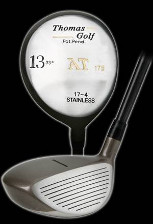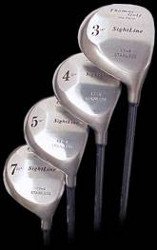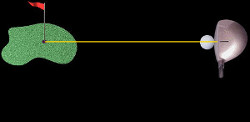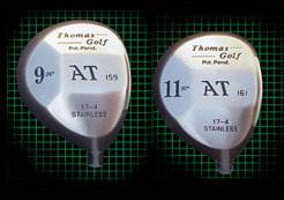
Club tested: Thomas Golf Fairway Woods (#3, #5, #13)
Club specs: Hand – Right; Lofts – 14° (3-wood), 18° (5-wood), 33° (13-wood); Length – 44” (3-wood), 43” (5-wood), 39” (13-wood); Shaft – Graphite, “R” (regular) flex
Price as tested: $95 per club (regularly $178)
About Thomas Golf products: All equipment made by Thomas Golf features the company’s patented Shot Accuracy Technology, an alignment indicator on the top of the club which helps assure precise aim. The company offers free custom fitting of all clubs on its website and sells its products exclusively online.
Club notes: The Thomas Golf fairway wood lineup includes 14 clubs in all, from the 2-wood (12° loft) through a 25-wood (55°) designed to replace a standard sand wedge. In other words, it’s possible to build an entire set of fairway woods, minus the driver and putter.

Clubheads are made from 17-4 stainless steel, the same material used by other top manufacturers, while three shaft options are offered: Ultralite – Low Torque Graphite, Standard-weight Steel, and Lightweight Step-less Steel.
We tested the 3-wood and 5-wood, which many golfers carry, and the 13-wood, a less conventional choice with loft equivalent to a 6-iron.
At address: The fairway woods features a traditional head shape and gray satin finish for a nice, clean look. Head sizes (180 cubic centimeters for the 3-wood, 160cc for the 5-wood and 150 for the 13-wood) are pretty standard for the modern era.
As with all Thomas Golf clubs, it’s the alignment indicator – a thin black stripe directly in line with the sweet spot, and precisely perpendicular to the clubface – that makes these fairway woods stand out. Not only does the guide ensure proper clubface aim, it’s a huge help in correctly setting up your feet and body.
As loft increases, the fairway wood heads become more rounded. This is mostly noticeable when looking at the bottom of the heads, however. With the 13-wood, there’s no awkward or off-putting visual at address.

Swinging it: Our graphite-shafted models were well balanced and smooth, the shaft true to its “regular” flex rating – not too stiff, not too “whippy.” Little or no snagging was noted on shots from fairway or rough. The 13-wood performed particularly well from taller grass. Stability was good with all three clubs whether hitting from tee or turf.
At impact: While we’re all for space-age materials, there’s something to be said for good ol’ stainless steel. Case in point: The pleasing sound and feel of the Thomas fairway woods. Fortunately, the aesthetic appeal doesn’t come at the expense of distance. The ball springs off the clubface with a powerful jolt.
Ball in flight: All systems go. We saw no excess spin when hitting the 3-wood or 5-wood from a tee; each produced a medium trajectory on fairway shots. The 13-wood, tested by a senior golfer, got the ball up quickly – carry was a little higher than with his 6-iron, our man reported.

Playability & forgiveness: If you’re inclined to hit a fairway wood when a shaped tee shot is needed, the Thomas fairway woods will fit the bill. If it’s accuracy you’re after, it delivers there too. Toe shots swung gently back toward the target. Miss-hits lost some carry yardage, but made up most of it with plenty of roll.
Bottom line: Often overlooked in the Age of the Hybrid, fairway woods remain a vital component of a well rounded set. If you prefer to stick with a 3-, 4- or 5-wood instead of equivalent hybrids, you’ll appreciate the performance of Thomas Golf’s fairway wood models.
Golfers searching for alternatives to irons would do well to consider the company’s higher-lofted fairway woods, like this set’s 13-wood. It’s easy to hit, performs beautifully from the rough and generates a high ball flight with minimal effort.





